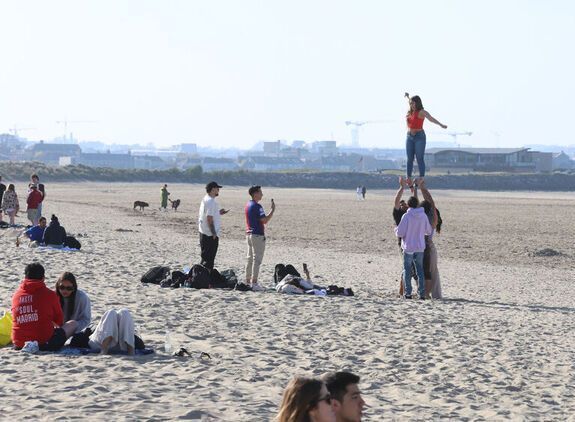[caption id="attachment_66751" align="aligncenter" width="600" caption="Ireland's Paddy Wallace steps off the plane at Auckland Airport."]
The staging of the Rugby World Cup is a difficult period for many of us who don't understand and appreciate this obviously thrilling game. As a public service then to those of us who haven't learned to drive around with small oval balls rolling around the back windows of our cars in the past decade, we are today offering a complete "Bluffer's guide to rugby's real, authentic, genuinely magnificent World Cup."
Number One: When the ball is kicked out of play, it's customary to applaud. Yes, we know this is contrary to the norm in most other field games but rugby has its own bizarre rules and traditions. Lashing the ball into the crowd is apparently a tactical move in this sport, not a mistake or a panicky gesture by a player frightened of getting whacked by one of the behemoths homing in on his outstretched leg. If watching with other people, it's best to nod the head when the ball is kicked out over the line. This gives the impression you know something that you don't.
Number Two: Should an Irish player commit an obvious act of foul play (even though the chances of that happening are absolutely miniscule), you need to know some key phrases to use. In the event of an eye-gouging incident, you adopt a lawyerly tone and say with furrowed brow: "His finger may have made incidental contact with the guy's eye alright but he wasn't looking so he definitely didn't mean it." This is the standard response from the Irish media so nobody will think you are foolish and/or blind for opting for this type of legalese instead of calling it as you see it.
Number Three: The same principle applies to any type of stamping. Should a green shirt be caught plowing into the head of a prone opponent with his foot, it's not what it seems. At all. Unless you want to stand out from the truly knowledgeable fans, you need to roll out another stock response. "He was trying to ruck the loose ball and your man was on the wrong side anyway." I'm not even sure what the second part of the sentence means but in rugby-speak, that more or less justifies the type of kicking violence that might attract police interest off the field of play.
Number Four: When reading newspapers over the next month, you will come across player columns written from inside the camp. As a non-rugby person, your first instinct will be to find these to be ridiculously sophomoric and childish accounts of pranks like wrapping some old equipment guy in tape and/or moving furniture out of hotel rooms. They only seem like that. They are actually hilarious and you must be seen to laugh aloud while reading them in public. They will also offer a quick study of the nicknames of the key players in the squad, always a boon for the arriviste rugby fan.
Number Five: Should Ireland not do well, don't describe their performances as terrible or putrid. Instead, you should resort to terms like "courageous but unfortunate" or "just not clicking on the day". If you are searching for suitable safe words, you can just copy what some of the RTE apologists will be saying about "the inability to find form, a bad time of the year for the Irish players just starting their season etc..." There will be no shortage of excuses on offer from our national broadcaster, the sport's biggest fan, so tuck in.
Number Six: Should any Irish supporters or, indeed, fans from any nation get into trouble off the field in New Zealand, their behavior must never, ever be described as hooliganism. Any drunken antics come under the banner of "high-jinks" or "just a few lads letting off some steam." This also applies to any disgraceful carry-on on airplanes on the way to the tournament. Just boys being boys. Lads being lads. Under no circumstances is this to be thought of as upstanding citizens disgracing themselves while drunk and on tour without their wives. Only common soccer hooligans do that kind of thing.
Number Seven: If Ireland has a disastrous tournament and makes an early exit (not that we are wishing for that or anything), it would be unfair to point out that the Irish rugby team have been shilling for every product known to man in the build-up to this event. They weren't shilling at all. They were actually promoting the sport and assisting in the grander marketing strategy designed to turn it into the true national game. They definitely weren't distracted by all the photocalls with models. Soccer players and Gaelic footballers get distracted by these things, rugger men are just doing their bit for the cause of growing the audience.
Number Seven: In the aftermath of any failure to perform, it's also very legitimate to point out during the post-mortem that the Heineken Cup is bigger these days than the World Cup so a poor Irish display isn't that important anyway. Never mind that the three best rugby countries in the world have no part in the Heineken thingy, just keep telling people we'll always have Munster and Leinster. You can back up this (rather specious) argument by drawing parallels with soccer's (actual) World Cup and how it's been outgrown by the Champions' League. This will particularly impress other bandwagon jumpers.
Number Eight: When it comes to the national anthems before the game, try not to throw up during "Ireland's Call." Nobody else likes it either but in these politically correct times, it's quite fashionable to pretend that it's the chosen song of the peace process, the soundtrack to our era of unity and reconciliation. Whatever you do, don't ask why if they were going to go down the road of tokenism towards the benighted province in the north they couldn't have picked a better song by an Ulster writer, say something like Bobby Sands's "Back Home in Derry."









